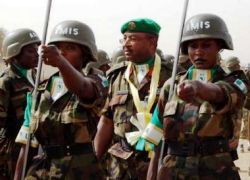African Union says lacks fund to maintain Darfur presence
Aug 16, 2006 (CAIRO) — The African Union lacks the funds to maintain its peacekeeping force or to boost its efficiency amid a deteriorating security and humanitarian situation in Sudan’s Darfur, a top AU official in Sudan said as the U.N. Security Council prepares to discuss a U.N. force for the region.
 While the U.S., the AU and others have called for deployment of a strong U.N. peacekeeping force to replace the ill-equipped and underfunded AU force in Darfur by Oct. 1, the Sudanese government vocally opposes the move. The U.N. has asked the 7,000-strong AU force to stay beyond the end of its mandate in September.
While the U.S., the AU and others have called for deployment of a strong U.N. peacekeeping force to replace the ill-equipped and underfunded AU force in Darfur by Oct. 1, the Sudanese government vocally opposes the move. The U.N. has asked the 7,000-strong AU force to stay beyond the end of its mandate in September.
But the chief AU negotiator in Sudan said the AU hasn’t yet decided whether it would prolong its mission.
“We can only stay if we are provided the adequate funding and equipment,” Sam Ibok told The AP in a phone interview from the Sudanese capital.
“We came to help the Darfurians,” Ibok said. “But Darfur rebels are attacking our people and killing our people, enough is enough,” he said, echoing a widespread feeling of dismay among AU personnel as they face rising hostility from various Darfurian factions that accuse it of failing to end the violence.
International aid agencies also say insecurity has worsened in Sudan’s remote western region since the signing of a peace agreement last May. Only one rebel force joined the government in signing the agreement, and infighting among rebel factions is blamed for much of the increased violence since May.
The U.N. World Food Program said Wednesday that insufficient funding could force it to reduce the food rations it distributes to over 6 million people in Darfur.
“But funding is not the only problem,” WFP said in a statement. “The deteriorating security situation…has made it too dangerous for truck convoys to drive through large areas in north and south Darfur, where fresh outbreaks of fighting and banditry have occurred.”
“While the news cameras are focused on the conflict in Lebanon, the situation in Sudan has quietly grown more dangerous and desperate than ever,” said WFP’s representative in Sudan, Kenro Oshidari.
U.N. Secretary-general Kofi Annan has laid out options for a much more muscular U.N. operation “to establish a stable and secure environment to protect civilians” and support implementation of the peace deal in Darfur.
The plan envisions a U.N. force of between 15,300 and 18,600 troops, depending on the number of aircraft, helicopters and rapid reaction troops. Annan also proposed more than tripling the 1,560-strong AU police contingent to about 5,300 U.N. officers.
If approved by the council, the U.N. peacekeeping mission in Darfur would become the U.N.’s largest. But Annan has said the U.N. cannot take over peacekeeping without the Sudanese government’s consent and cooperation.
John Bolton, U.S. ambassador to the U.N., said earlier this week he hoped the push for an international peacekeeping force in Darfur would make progress in the coming days.
“The question, as always, is whether the Security Council can overcome the political objection from several significant member governments, including two permanent members and the government of Sudan,” Bolton said, in an apparent reference to China and Russia.
China is the largest buyer of Sudanese oil exports and a strong backer of the regime.
Meanwhile, a rebel group that was asked to leave the AU’s headquarters in Darfur because it refuses to sign the peace agreement said its expulsion could lead to an escalation of violence.
The AU said the Justice and Equality Movement had been advised to leave AU headquarters in the North Darfur town of El Fasher because it wasn’t supporting the peace deal and the main rebel group refuses to hold talks with them.
“It doesn’t mean we have lost hope that JEM will eventually join the peace process, but it reflects that we can’t fund and host people who are doing nothing,” the AU’s Ibok said.
JEM delegate Mohammed Abbasher Ahmed was quoted as telling Sudan’s Akhbar Al Youm newspaper his group regarded the AU’s decision “as a declaration of war.”
Delegates from JEM and other rebel groups were stationed at the AU headquarters as part of an effort to bring peace to a region where more than 200,000 people have been killed since 2003, when ethnic African tribes revolted against the Arab-led Khartoum government. The revolt triggered massive retaliation by pro-government militias, and more than 2 million people fled their homes because of the fighting.
(AP/ST)
